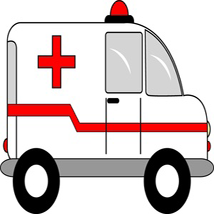
STARofLIFE
Union County, NJ
Male, 24
I have been a certified Emergency Medical Technician (E.M.T.) for over 6 years. I am the true "first responder" and have been dispatched to over 1,000 calls including medical, trauma, and psychiatric emergencies. How do I handle the stress and what goes on in my mind when YOUR life is on the line? Find out by asking me anything!
This is a question I am always asked. Generally, I would say burns or car accidents are pretty horrific and gruesome. However, my most traumatic call involved a construction worker putting up a ceiling fan in a new house. The worker lost his balance and fell off his ladder. He managed to catch his wrist on an jagged piece of porcelain sink. He cut through both his radial and ulnar arteries (the arteries in the wrist suicide victims use). He literally was pumping blood out of these arteries every time his heart beat. I quickly elevated his arm and applied direct pressure to the wound. However, the injury was so severe that we could not control his bleeding. At this point, the floor of the ambulance was covered in blood, as were my pants. I could actually smell the iron from the hemoglobin as the blood clotted on the floor. That's how much blood this guy was losing. On the way to the hospital, the paramedics started two IV fluid bags and I still was squeezing the patients forearm. We drove him to the state level 1 trauma center and rolled him right into the OR for the vascular surgery team to begin to save his life. Unfortunately, I never found out if this patient lived or died. This is the nature of EMT work.
While it is tempting, I have never done this. I would imagine we would get in trouble with the police. Interestingly, there are no rules on when you should or shouldn't use the siren. Many times if I am transporting a patient who is not having an acute medical emergency, I will drive to the hospital without lights or sirens. Driving with lights and sirens is the most dangerous thing I do as an EMT. While it is fun and exciting, I care more about transporting my patient and my crew to the hospital as safely and securely as possible. Furthermore, when responding to psychiatric emergencies, we do not use the lights and sirens as to not agitate or scare the patient. One time, after picking up food, I accidentally turned the emergency lights on without knowing it. I was confused as to why the cars in front of me were all pulling over. I then realized what I had done and quickly shut them off. This was during the daytime when its hard to see the lights from inside the ambulance.
No, I do not think 18 is too young to become an EMT. To tell you the truth, I've met a few 40- or 50-year-old EMTs who I would be a little hesitant to let treat me in a life-threatening emergency. Being a "smart" or "responsible" EMT comes down to one thing, EXPERIENCE. How can an 18 year old be experienced in anything? Let me explain. In New Jersey, one can obtain a provisional EMT license by taking taking a course and passing the state exam as young as 16 years old. This allows the 16-year-old EMT to join volunteer squads and "ride-along" as a probationary member. Once this EMT turns 18, he or she will have had two years of experience, which is a good amount in the volunteer business. Furthermore, there's no reason to believe that an adult can't come to a mature and independent decision better than an 18-year-old. This is what the EMT course teaches: acute medical decision making based on signs and symptoms. During training, the student needs to pass both didactic and practical examinations many times. This prepares anyone who passes the state exam to handle life threatening emergencies. Finally, my volunteer squad requires at least two certified and experienced EMTs per ambulance. Any member who joins my squad needs to pass our own training process which lasts anywhere from a few months to a few years before they are allowed to take calls with only one other riding member. This policy varies between organizations but the fundamental nature is still the same. The idea is to make sure the member has enough experience and is trusted by the other members before they are allowed to handle a life-threatening emergency by themselves. In conclusion, I encourage anybody older than 16 to apply to become an EMT with confidence.
Luckily, this has never happened to me. However, when it does happen, the consequences tend to be grave. The fact that ambulances run red lights and disobey the rules of the road make driving an ambulance a very difficult task. I encourage everyone who is reading this to PLEASE pull over for an ambulance, fire truck or police car even if the vehicle is on the other side of the road. You wouldn't believe how many cars won't yield to me! It's dangerous and drives me crazy. I actually responded to an ambulance accident once, which is ironic. A car in front of the ambulance stopped short and because of momentum, a small fender bender occurred. Fortunately, no one was hurt. We transported the original patient to the hospital.
Antiques Dealer
 Does a piece's value increase significantly if it has a cool "back-story" to go along with it?
Does a piece's value increase significantly if it has a cool "back-story" to go along with it?
Bouncer
 What's the best way to "get in good" with the bouncer at the door?
What's the best way to "get in good" with the bouncer at the door?
Auto Mechanic
 Are mechanics more likely to take advantage of female customers than males?
Are mechanics more likely to take advantage of female customers than males?
First off, this policy varies by organization. State law requires at minimum a certified EMT and a certified EVOC (emergency vehicle operations course) driver per ambulance. My squad requires at least TWO state certified EMT who are also EVOC certified per crew. Thus, both members are able to provide medical care and drive the ambulance. To answer your question, I can either drive the ambulance or provide patient care. Usually, my partner and I will simply take turns driving. We alternate. There is often a "probationary" member who is either certified or not certified. This member just observes and acts as an extra pair of hands to help lift the patient and transport equipment. The idea is that this "probationary" member will become a regular member after receiving state certification and passing the squad's training program.
I have never had a patient die in front of me. I have, however, responded to patients who are DOA (dead on arrival). This has only happened a few times to me and each time I was responding to a nursing home. Each person deals with death as an EMT differently. However, if the situation was particularly traumatic of difficult (death of child) we are required to attend a small group counseling session. Personally, I am not bothered by these types of situations.
Yes, we treat anyone and everyone. We are a volunteer squad and run entirely off of tax-deductible donations. The real issue is with the MICU (Mobile Intensive Care Unit) Paramedics. These are emergency health care providers who are dispatched by the hospital and can provide a much greater level of care than the EMT. As soon as the Paramedics begin an examination, a large bill (around $1,000) is generated. Now, Paramedics would never deny treatment based on insurance needs in the field. To the best of my knowledge, the patient is billed and must pay out of pocket. The patient could apply for charity care or work something else out.
-OR-
 Login with Facebook
Login with Facebook (max 20 characters - letters, numbers, and underscores only. Note that your username is private, and you have the option to choose an alias when asking questions or hosting a Q&A.)
(A valid e-mail address is required. Your e-mail will not be shared with anyone.)
(min 5 characters)
By checking this box, you acknowledge that you have read and agree to Jobstr.com’s Terms and Privacy Policy.
-OR-
 Register with Facebook
Register with Facebook(Don't worry: you'll be able to choose an alias when asking questions or hosting a Q&A.)